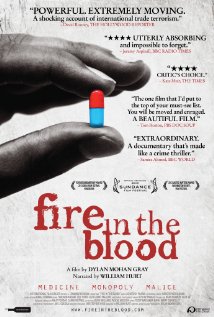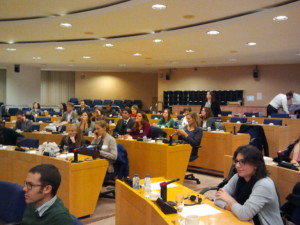 In the week that marked the 25th World AIDS Day, the European Parliament Working Group on Innovation, Access to Medicines and Poverty-Related (EPWG) organised a debate on HIV/AIDS and access to medicines following the screening of the award-winning documentary “Fire in the Blood”. The event was organised by Medicines sans Frontières’ Access to Essential Medicines Campaign and hosted by MEPs members of the EPWG: Carl Schlyter and Rebecca Taylor.
In the week that marked the 25th World AIDS Day, the European Parliament Working Group on Innovation, Access to Medicines and Poverty-Related (EPWG) organised a debate on HIV/AIDS and access to medicines following the screening of the award-winning documentary “Fire in the Blood”. The event was organised by Medicines sans Frontières’ Access to Essential Medicines Campaign and hosted by MEPs members of the EPWG: Carl Schlyter and Rebecca Taylor.
Fire in the blood is an inspiring work that shows how access to antiretroviral therapy (ARVs) was totally denied to poor people and people living in developing countries during the HIV epidemic in the late 90s and 2000s. The documentary shows that the lack of access to essential drugs is the result of multiple factors, including big pharmaceutical companies artificially maintaining unaffordable prices, patent systems impeding the production of much cheaper generics and international trade agreements applying strict rules to the commercialisation of life-saving products.
The following debate was enriched by the presence of the film’s director, Mr Dylan Mohan Gray, and by several representatives of civil society, who underlined that patent monopolies continue to hamper access to medicines, especially for poor people. Patent protection has increased in key generics-producing countries and in importing countries, pushing up the price of medicines by blocking price-lowering competition among generic producers.
 At the European level, the Council of the EU and the European Parliament are currently discussing two initiatives to improve Research and Development of new drugs: the European and Developing Countries Clinical Trial Partnership II (EDCTP) and the Innovative Medicines Initiative 2 (IMI). These initiatives have the potential to improve availability of global health tools, but to do so data and end products created by projects financed by these initiatives should be affordable and accessible. Members of the European Parliament should ensure that the results of research financed with the money of European citizens are not privatised by big pharmaceutical companies.
At the European level, the Council of the EU and the European Parliament are currently discussing two initiatives to improve Research and Development of new drugs: the European and Developing Countries Clinical Trial Partnership II (EDCTP) and the Innovative Medicines Initiative 2 (IMI). These initiatives have the potential to improve availability of global health tools, but to do so data and end products created by projects financed by these initiatives should be affordable and accessible. Members of the European Parliament should ensure that the results of research financed with the money of European citizens are not privatised by big pharmaceutical companies.


